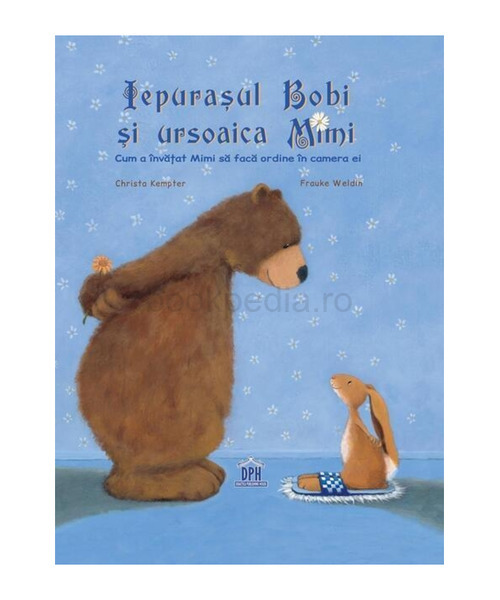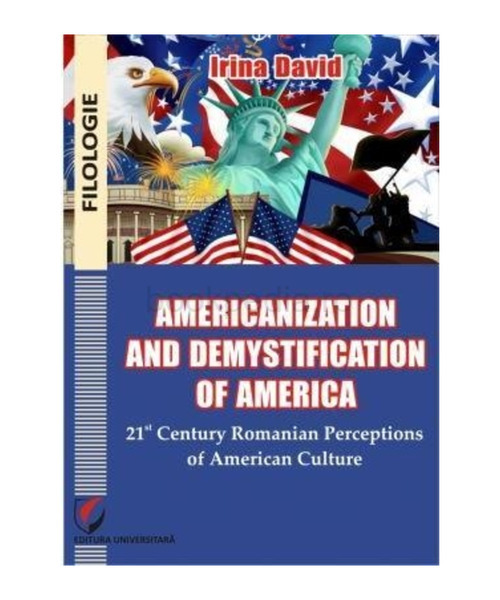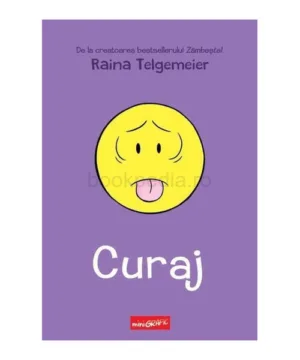
Abordarea tipurilor de texte clasele 3-4
35,10 lei

Printesa care nu putea sa doarma
20,80 lei
Americanisation and demystification of America. 21st century Romanian perceptions of American culture
27,00 lei
| Authors | Irina David |
|---|---|
| Publisher | Universitara |
| Year | 2017 |
| Pages | 182 |
Informații suplimentare
| General | |
|---|---|
| Authors | Irina David |
| Publisher | Universitara |
| Year | 2017 |
| Others | |
| Identification | |
| ISBN-13 | 9786062806514 |
| Format | |
| Pages | 182 |
Descriere
Americanisation and demystification of America. 21st century Romanian perceptions of American culture – Irina David
Why another study on American influence? The current research study focuses on identifying the main Romanian perceptions of the United States of America, as well as the various ways in which elements belonging to American culture are integrated in the culture of Romania, a country that belonged to the former South-East European Communist Bloc. The research efforts will concentrate on the period after 1989, but references will also be made to previous years, in an attempt to emphasize the connections between past experience and current evolution of attitudes related to American culture, to its impact on Romanian one, as well as of proor anti-American feelings. This period was selected due to the fact that the fall of the communist regime and the end of the Cold War generated a radical reconfiguration of America’s role in the world, and implicitly of its relations with Europe, especially with the postcommunist European countries. The research area will be limited to the field of printed media culture, and the study will try to illustrate how cultural publications in Romania reflect phenomena as cultural Americanization or anti-Americanism.
In recent years, there have been numerous studies debating the phenomenon of Americanization and its impact on European culture, as well as the European reactions to the increasingly strong influence of the United States throughout the world, which many refer to as American cultural imperialism. If Bark (2007) and Martinelli (2007) focus on emphasizing the differences between Europe and the United States, other authors, such as Crockatt (2003), Hollander (2004), Judt and Lacorne (2005), O’Connor and Griffiths (2006), or Markovits (2007) discuss the way in which these differences create tensions that can lead to the appearance of anti- American reactions in certain European countries. The studies mentioned above are mainly based on a political and socio-economic perspective. There are of course authors that have based their discussion on a predominantly cultural foundation. Kroes (1996), Pells (1997), Epitropoulos and Roudometof (1998), and more recently Beck, Sznaider and Winter (2003) focus on how aspects of American culture have influenced the culture of the European countries.
Romanian culture and the American impact on it are not discussed as a main topic by any of the authors mentioned above. If comments about Romania do appear, they are usually integrated in chapters or subchapters dedicated to the entire post-communist region. On the other hand, there are few Romanian authors who have written books on Romanian culture in relationship to the American one. The Romanian anthropologist Lucian Boia, who has published lengthy studies on the specificity of the Romanian culture, also discusses the interaction between our culture and the American one as part of chapters dealing with the contact between the Romanians and the foreigners. Another significant contribution to this field was brought by Bogdan Barbu (2006), who wrote a booklength study on Romanian-American interactions. However, the focus of his research is represented by the Cold War period, and no references are made to the post-communist context.
The increasing interest in post-communist reconfigurations, especially in issues such as Americanization, anti-Americanism or Romanian-American cultural interactions has resulted in extremely valuable collections of essays, most of them based on contributions during conferences organized by members of the academia. The articles published in these volumes address a variety of issues related to Romanian and American cultural environment, as well as to the connections between the two cultures. Although their contribution is undeniable, they provide a fragmented image of the impact of American culture on the Romanian one, as well as of how this influence is perceived. Therefore, I consider my research could fill a gap in the literature, by providing a thorough unitary analysis of the impact that the characteristics of Romanian culture have on the phenomenon of cultural Americanization, as well as on the relevance of cultural Americanization on redefining post-communist Romanian culture.
Before the publication of this book, some of the ideas presented in it and some of the aspects that are analysed here made the subject of discussions held during international conferences. Previous versions of some sections of the book were published in conference proceedings and in journals.
Irina David














